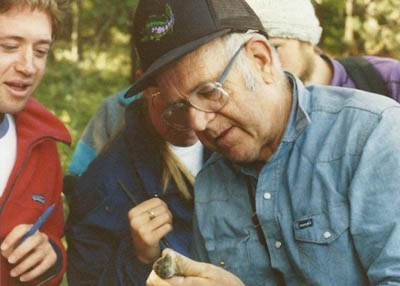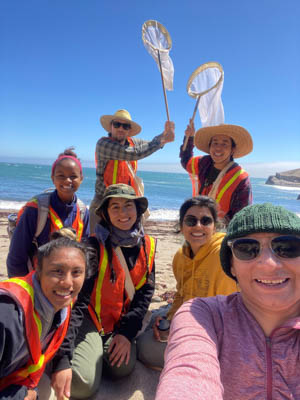Campus News
Celebrating 50 years of immersive natural history education at UC Santa Cruz
In June, an event will gather UC Santa Cruz alumni, faculty, staff, current students, and community members to honor the legacy of Ken Norris and natural history at UCSC, including the 50th anniversary of Natural History Field Quarter.



In 1973, renowned ecologist and environmental studies faculty member Ken Norris launched a new course that would become a beloved UC Santa Cruz tradition: Natural History Field Quarter. In the program’s early years, Norris would load up a big blue bus with a teaching assistant, a stockpile of outdoor gear, and about 20 eager UC Santa Cruz students.
“We’re off on the greatest adventure of our lives!” Norris would proclaim.
Then the group would disappear into the wilderness. They studied natural history while camping in reserves across the state as part of a series of expeditions over the course of the academic quarter. Students learned new research skills, forged deeper connections with nature, and built community. For many, it was a transformational experience. And it’s one that UCSC students can still take part in today.
Ken Norris taught Natural History Field Quarter until his retirement in 1990, and though he died several years later, the course is one of many aspects of his legacy that have endured. Natural History Field Quarter is now a 15-unit environmental studies course offered each spring and co-taught by Ryan Carle and Chris Lay, the current director of the Kenneth S. Norris Center for Natural History. The course utilizes the UC Natural Reserve System—another product of Norris’ legacy—to teach students about the state’s diverse ecosystems.
Norris’ huge impact at UCSC also inspired the creation of the Kenneth S. Norris Center for Natural History in 2014. Part natural history museum and part resource center, the Norris Center aims to broaden the powerful transformative experience of Norris’ Natural History Field Quarter class through additional classes, internships, research projects, community-building events, and collaborations with other organizations.
This year, on the 50th anniversary of Natural History Field Quarter, the Norris Center will sponsor an inclusive weekend gathering for the entire UCSC natural history community to celebrate the first 50 years of natural history programs on campus and collectively envision the future. Anyone who has participated in the many natural history-related opportunities thriving at UCSC today is welcome to attend.
From June 3 through June 5, this gathering will bring together UC Santa Cruz alumni, faculty, staff, current students, and community members for a weekend of camping, outdoor activities, networking events, workshops, live music, and more at YMCA Camp Jones Gulch in the Santa Cruz Mountains. Online registration is required for attendance, and information on pricing, accommodation, COVID-19 precautions, and activities is available on the event page.
Norris Center Director Chris Lay hopes the gathering will be an opportunity for those who care about the natural world to have fun together, reflect on shared values, and support one another. Lay believes that building a strong, supportive community in natural history is crucial, especially given the heaviness of the environmental issues that the field is working to address.
“One big goal of this event is to gather together and remind ourselves of the things we can do to keep our spirits up and to make a positive difference for the natural world,” Lay said.
Professor Emeritus of Environmental Studies Steve Gliessman—who taught Natural History Field Quarter alongside Ken Norris beginning in the Spring of 1981 and later led the program from 1990 to 2012—said that many former students have gone on to become protectors of the environment, whether through careers in policy, conservation science, teaching, or the arts. And in many cases, students credited the course for helping to spark their passion.
“Being fully immersed in nature changes your whole perspective on yourself, your role in nature, and the role you can play in the future, and that’s a deep, heartfelt experience for our students,” Gliessman said. “Once people become completely comfortable in nature and see that they’re part of it, that stays in them and with them always.”
One former Natural History Field Quarter student, Sheryl “Shoo” Salasky (Rachel Carson ’78), went on to work for the Alaska Department of Fish and Game for a decade, helped with cleanup efforts in the wake of the Exxon Valdez oil spill, and became a commercial fisher. Salasky credits Natural History Field Quarter and Ken Norris’ teaching style with helping to build her confidence to continuously try new things throughout her career. She also admired how Norris always made learning fun and memorable.
“One of the things that made field quarter so magical was Ken’s exuberance and his playful curiosity about everything,” she said. “He was equally as excited to show us a little stink bug as a bighorn sheep. To Ken, all living things were fascinating.”
Current UC Santa Cruz student Dmitrius Rodriguez, who is studying environmental studies, economics, and philosophy, participated in Natural History Field Quarter last spring and said the personal connections and memories from that experience will likely last a lifetime. They still recall vividly the sights, smells, and feeling of excitement from one day in particular, as the group hiked over a mountain in the Sierra Nevada and down into Mono Basin. Rodriguez says that moment was made possible, in part, by the program’s efforts to make the outdoors more accessible and inclusive.
“I come from a background that made me feel like there was a barrier to the outside world, and Natural History Field Quarter tore down that barrier,” they said. “Now, I know that I can spend six weeks in nature out in a tent, and I may have been a little uncomfortable, but I have the ability and skills, and I have a trust in myself that I didn’t have before. I really enjoy backpacking and doing other things outdoors that would make my family nervous, but doing these things is important for my personal growth.”
Chris Lay said he hopes that gathering current UCSC students and alumni at the upcoming event will create opportunities to discuss how the Norris Center’s programs might continue evolving to meet the needs of new generations of budding naturalists. He also hopes networking could help graduates find career opportunities that allow them to pursue their passions, which is something that Sheryl “Shoo” Salasky is especially excited to support.
“Looking back, a lot of what I did in my life wasn’t necessarily planned; I just said yes to what sounded exciting, and what helped me along the way were the connections I had made with likeminded people,” she said. “Those connections support us and give us confidence to do good in the world. Others did that for me, and I want to pay that forward.”